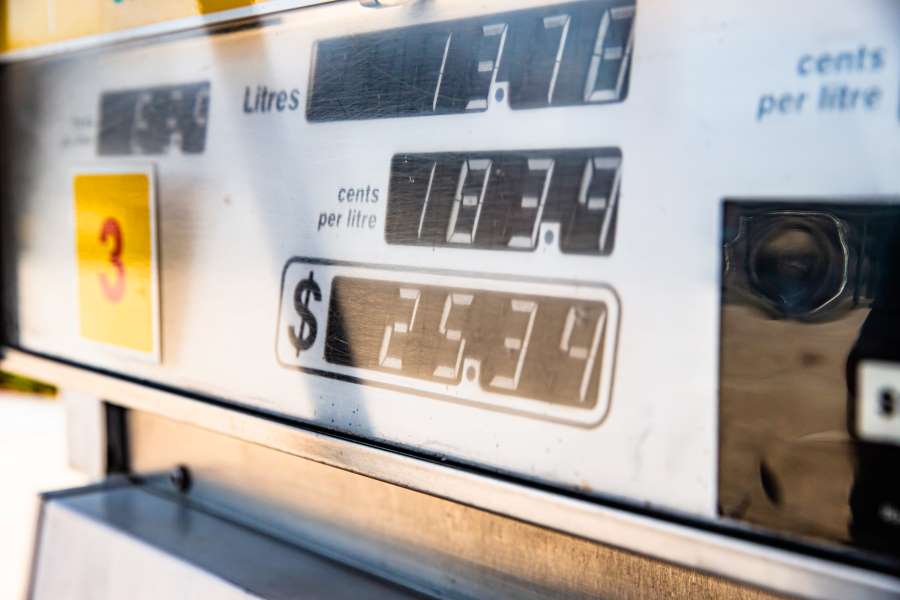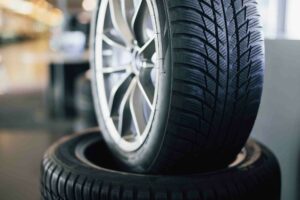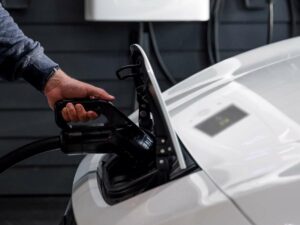Fuel costs are one of the biggest cost drivers in the vehicle fleet. Monitoring and optimizing consumption is more important than ever for fleet managers, especially in times when record values are being achieved at filling stations. Fortunately, there are a number of measures that can be taken to reduce fuel costs. Be it the driving style, the refueling time or the introduction of strategic route planning. With the right approaches, operating costs can be reduced and a contribution made to environmental protection at the same time. So what can fleet managers do to minimize fuel costs in the fleet? In this article, we present tried-and-tested strategies for efficiently reducing expenditure on gasoline, diesel and the like.
Contents
How are fuel costs calculated?
To help you keep a better eye on the fuel costs in your fleet, it is worth calculating your expenses regularly. The basis for the calculation is quite simple. The following formula can be used to calculate the fuel costs:
Fuel costs = (fuel consumption / 100) * distance traveled * fuel price
The fuel consumption is converted into liters per 100 kilometers by dividing it by 100. This value is then multiplied by the distance traveled and the fuel price per liter. The result shows the estimated fuel costs for the calculated route.
It is important to note that this is a rough estimate and actual fuel costs will depend on individual factors such as driving style, traffic conditions and vehicle condition. Nevertheless, the calculation provides a useful guideline for planning and cost management in the fleet.

What is affecting fuel costs at the moment?
According to Statista, the price per liter for premium gasoline has increased by more than 55 cents in the last twenty years. Prices have risen enormously in recent months in particular. One of the reasons for this is the ongoing conflict in Ukraine.
In order to slow down this development and provide drivers with financial relief, the German government decided to reduce the energy tax on petrol and diesel for a period of three months from June 1, 2022. State funds amounting to three billion euros were used for this. The aim was to reduce the price of diesel by around 17 cents and the price of gasoline by around 35 cents. However, the relief package only led to a short-term fall in fuel prices.
Crises, the economy and taxes influence the price of fuel. As oil is traded almost worldwide in dollars, the exchange rate of the US currency also has a significant influence on prices. But competition between filling station operators is also causing fuel prices to fall or rise.
7 tips to help you reduce your fuel costs
There are various ways to save fuel and thus reduce fuel costs. The following tips will certainly help you to achieve success quickly:
- Efficient route planning
Routes should be planned as efficiently as possible to avoid unnecessary mileage. Ideally, these should be optimized so that stops are close together and drivers take the fastest route. This not only reduces driving time, but also fuel consumption. At the same time, vehicle wear can also be minimized.
- Anticipatory driving
An anticipatory driving style can significantly reduce fuel costs. This includes, for example, maintaining a steady speed, braking and accelerating in good time and avoiding unnecessary stops. Training courses in which drivers practise anticipatory driving or smooth acceleration and braking in traffic can also be helpful.
- Avoid idle times
Although a vehicle consumes less fuel when idling than when driving, letting the engine idle unnecessarily can still drive up fuel consumption. If the vehicle stops for more than 30 seconds, the engine should be switched off – also with regard to air pollution. Modern vehicles are designed so that the engine does not consume much fuel when starting.
Everything in view for maintenance?
Find out why proper maintenance is a must in every fleet and which dates you should not miss in your maintenance planner.
- Regular maintenance of the vehicles
Regular maintenance allows potential problems to be identified and rectified at an early stage. During maintenance, the engine, spark plugs, air filter and exhaust system, for example, are checked. A well-maintained vehicle works more efficiently and therefore consumes less fuel per kilometer driven.
- Check tire pressure
Regularly checking the tire pressure also helps to reduce fuel consumption and therefore fuel costs. If the tire pressure is too low, rolling resistance increases and so does fuel consumption. Tires that do not have enough air also wear out more quickly. Therefore, check the tire pressure regularly.
- The use of fuel cards
Fuel cards are not only practical to use, they can also help to reduce costs. They have the advantage that the fleet manager can keep an eye on the drivers’ fuel purchases transparently and in detail. In addition, special conditions are even available at selected filling stations.
- Refuel at the right time
Fuel prices at filling stations often fluctuate several times during the course of the day. According to a study by the ADAC, the best time to fill up is between 9 and 10 pm. Fuel prices are also usually cheaper between 6 and 7 pm. If you fill up in the morning, you often pay more.
Reduce fuel costs or avoid them completely? E-vehicles as an alternative
The purchase costs for e-cars are generally higher. Nevertheless, the switch is worthwhile, as they are cheaper in the long term and the more environmentally friendly alternative and can therefore not only reduce fuel costs, but even avoid fuel expenses altogether. In addition, electricity is generally cheaper than gasoline or diesel. According to the ADAC (as of April 2023), maintenance costs can also be lower compared to a conventional combustion engine. For example, electric cars usually have far fewer parts that are more susceptible to wear and tear.
The most important facts about reducing fuel costs
Operating costs can be reduced through efficient vehicle maintenance, fuel-efficient driving behavior and strategic route planning.
E-cars can be an alternative to petrol or diesel to avoid fuel costs in the fleet.
The calculation of fuel costs is worthwhile for fleet management in order to obtain an overview of the respective driving behavior, among other things.
Further Fleet Knowledge
If you liked this article and would like to know more about this topic, we recommend these articles.

Tire management in the fleet: more safety and lower costs



